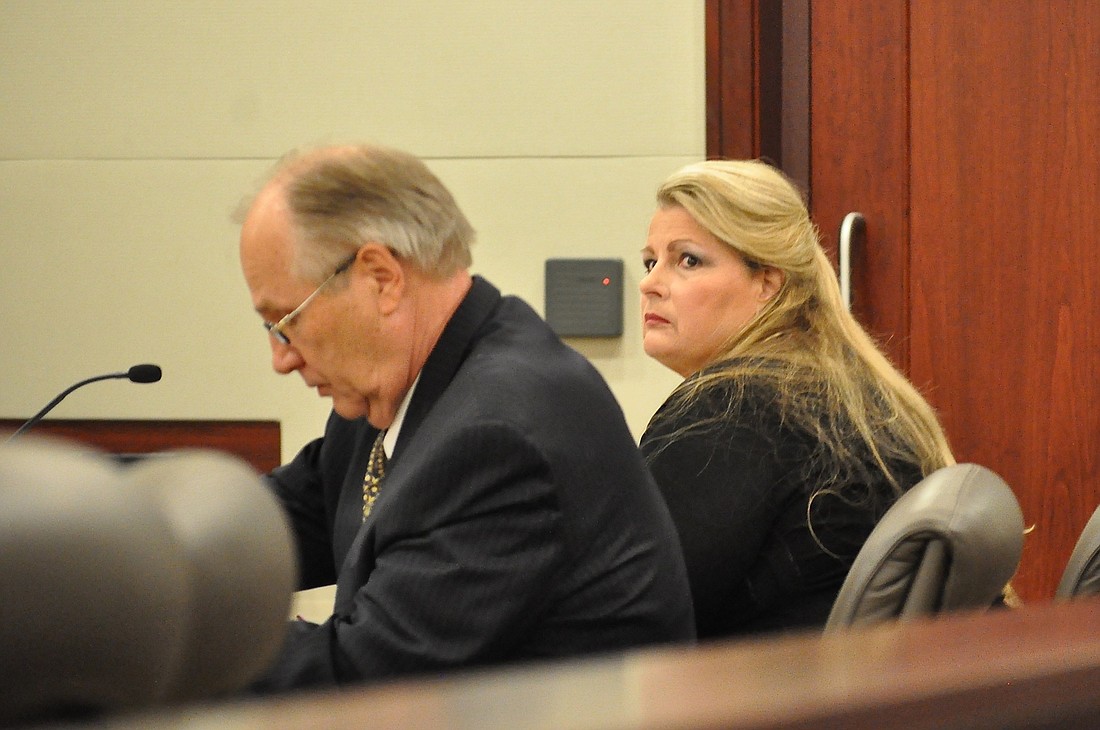- April 24, 2024
-
-
Loading

Loading

For the first time in the lengthy series of pretrials in the case against former elections supervisor Kimberle Weeks case, Weeks herself showed up in court March 24 as her attorney tried to convince the judge to split the one case into several and to throw out some of the 12 felony counts Weeks is charged with.
Florida law makes it illegal to record someone without their consent and to then distribute that recording, and Weeks is charged with seven counts of illegally recording conversations of local and state officials and others, and with five counts of disseminating those recordings.
Joerg Jaeger, Week' attorney, wants several of the dissemination charges thrown out. The reason? Weeks had played the recording in question — a whispered conversation between County Attorney Al Hadeed and County Commissioner Charlie Ericksen — during a public Canvassing Board meeting before sending it out to the News Journal, WNZF and a third party. By playing the recording during a public meeting, Jaeger said, she'd made it public record, and shouldn't be prosecuted for distributing it thereafter.
"The argument that the defense is propounding is too incredulous to make sense," Assistant State Attorney Jason Lewis said. "To say that if someone plays something unlawfully at a public hearing, it converts it into a public record. ... It just doesn’t make sense."
If that were the case, he said, anyone who recorded something illegally and wanted to be able to distribute it could just go to any public government meeting, play the recording during the time set aside for public comment, then feel free to distribute it at will.
Circuit Judge Margaret Hudson didn't rule at a hearing March 24 on Jaeger's motion to have those charges thrown out, saying she wanted to look at precedent. But she wasn't persuaded. If Weeks had given only the minutes from the meeting to her supporters and to the press, Hudson said, she might agree with the defense. But Weeks had sent out the original recording itself.
Jaeger made other motions, but Hudson didn't rule on them at the hearing.
He said that in one instance, in which Weeks recorded a phone conversation with Secretary of State Ken Detzner and others in his office, that Detzner hadn't explicitly denied her permission to record — she'd asked him if she could — because he'd said only that he was "not comfortable" with that, rather than simply, "No." Hudson told him he could argue that matter at trial.
Jaeger also motioned to have the judge separate the trial into three different ones, based on the details of the different recordings.
"The state's just trying to load all this stuff and say 'she records stuff,' and I believe that is highly prejudicial to my client," Jaeger said.
The State Attorney's Office has sought to try all 12 counts at once, Lewis said, in order to establish a common intent and motive and show that the recordings weren't accidental. That case was bolstered by the fact that Weeks had made surreptitious recordings repeatedly.
Still, the State Attorney's Office didn't object per se to dividing the case — at issue was which counts might be separated out — and the judge was wiling to consider the defense's request to separate out counts two and three, in which Weeks was charged with recording people while not acting in her official capacity, from the other counts, in which she recorded them while acting as the county's elections supervisor.
Two lawmen testified at the hearing: Phil Lindley, the now-retired FDLE agent who led the search of Weeks' office, and Holly Hill Police Officer Michael Coomans, who'd investigated a case concerning Weeks' son.
Weeks had recorded a phone conversation with Coomans without the officer's knowledge, and Jaeger sought to get him to say that he had no expectation of privacy in that conversation: Several other people had been phoned in to join the conversation, and at least some of them had it on speakerphone. How did Coomans even know who was listening to the conversation? Jaeger asked.
"She told me who was present, and I believed her," the officer replied.
When Lewis questioned him, Coomans said he'd never given permission for Weeks to record him and that he didn't know he was being recorded.
Lindley talked about his search of Weeks' office, noting that when he showed up requesting five documents from Weeks — all of them public record — she initially refused to turn them over. When she finally did supply some of them, she made him sign for them, a move Lindley called "extraordinary."
Jaeger tried to sow doubt about whether the recording of the whispered conversation between Ericksen and Hadeed was in fact illegal. Weeks made the recording during the scheduled time for a Canvassing Board meeting; Ericksen was a Canvassing Board alternate, while Hadeed was the Canvassing Board attorney and also the county attorney. The defense argued that the recording was taken in the context of a public meeting, which is legal to record under the state's open records laws.
But the two men had the conversation while they were alone in one room after the Canvassing Board had left that room and convened in a neighboring room to count ballots. Hadeed had testified to Lindley that he considered the conversation private; neither man knew they were being recorded.
But they had some warning, Jaeger suggested: He showed Lindley a photograph of a sign on the door to the Supervisor of Elections office, which says the premises may be recorded. Lindley said he hadn't noticed or read it. When he enters a restaurant, he said, he doesn't read the door signs saying what credit cards are accepted, either. And, Lindley said, when he spoke to the Canvassing Board members, "Everyone said they’d been told (by Weeks) they were not being recorded."